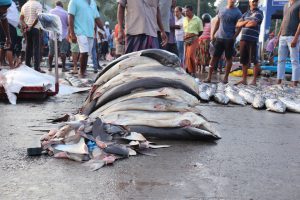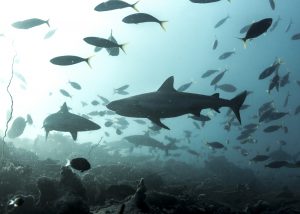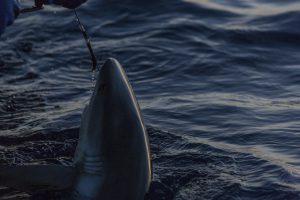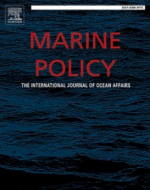Social Drivers for Shark Fishing Amongst Sri Lankan and Indian Fishers
Project Overview
Shark fisheries in the Indian Ocean are poorly understood with accurate information on catch rates and socio-economic dependence limited. Research has primarily focused on the international trade in fins, however there is growing recognition of the importance of shark meat and other products, such as liver oil, to Indian Ocean countries. Sri Lankan and Indian fishers are known to leave national waters to target sharks primarily in international waters, however some vessels also enter protected foreign waters, such as the Chagos Archipelago and the Maldives. The motivations for these behaviours, including economic incentives, are complex and poorly understood. Understanding the motivations for these behaviours could help to align MPA management with fisher incentives and objectives to help mitigate the impact of illegal fishing on shark populations.
The aim of this project is to provide an understanding of the socio-economic and cultural motivations for Sri Lankan and Indian fishers to fish sharks outside of their national waters. We use a variety of tools, including questionnaires, interviews and landing surveys, within communities of fishers in Sri Lanka and India.
Overall, our research highlights the need to understand the socio-economic context of MPAs and integrate this knowledge throughout every stage of MPA creation and implementation. It acknowledges the connectivity of MPAs with surrounding countries and the need for global coordination in protecting these areas from fishing pressure.
Research on how MPA regulations influence fishing behaviour is vital to ensuring they make positive ecological impacts
Key Facts



News
Publications

The Socioeconomic and Environmental Niche Protected Areas Reveals Global Conservation Gaps and Opportunities
Mouillot, D., Velez, L., Albo Nicolas Casajus, C., Claudet, J., Delbar, V., Devillers, R., Letessier, T.B., Loiseau, N., Manel, S., Mannocci, L., Meeuwig, J., Mouquet, N., Nuno, A., O’Connor, L., Parravicini, V., Renaud, J., Seguin, R., Troussellier, M., Thui, W. (2024). The socioeconomic and environmental niche protected areas reveals global conservation gaps and opportunities. Nature Communications

Valuable Bycatch: Eliciting Social Importance of Sharks in Sri Lanka Through Value Chain Analysis
Collins, C., Letessier, T.B., Benaragama, A., Broderick, A., Wijesundara, I., Wijetunge, D., Nuno, A. (2023). Valuable bycatch: Eliciting social importance of sharks in Sri Lanka through value chain analysis. Marine Policy.

Illegal Fishing Spike in MPA During COVID-19 Calls for Broader Adaptive Management
Collins, C., Kerry, C.R., de Vos, A., Karnad, D., Nuno, A., Letessier, T.B. (2023). Illegal fishing spike in MPA during COVID-19 calls for broader adaptive management. Current Biology.

Using Perceptions to Examine Human Responses to Blanket Bans: the Case of the Thresher Shark Landing-Ban in Sri Lanka
Collins, C., Letessier, T.B., Broderick, A., Wijesundara, I. and Nuno, A. (2020) Using perceptions to examine human responses to blanket bans: the case of the thresher shark landing-ban in Sri Lanka. Marine Policy.

Isolation and No-Entry Marine Reserves Mitigate Anthropogenic Impacts on Grey Reef Shark Behavior
Juhel, J. B., Vigliola, L., Wantiez, L., Letessier, T. B., Meeuwig, J. J., & Mouillot, D. (2019). Isolation and no-entry marine reserves mitigate anthropogenic impacts on grey reef shark behavior. Scientific reports, 9(1), 2897.






